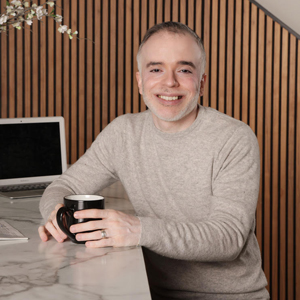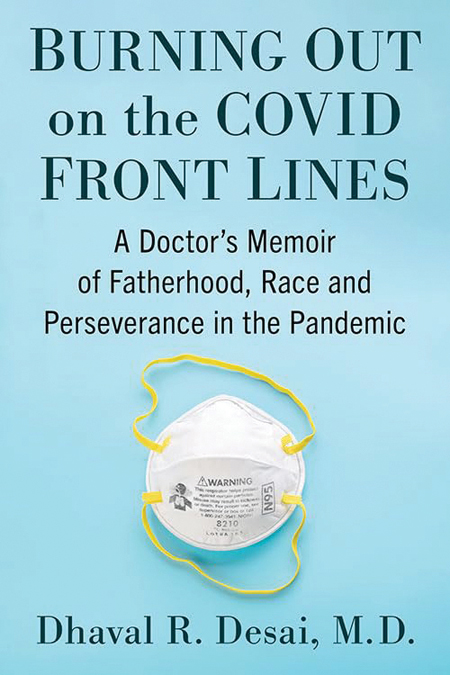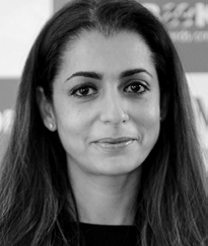A Physician's Reflections on Life in the Time of Covid

[Left] Photo: Sara Hanna/@ATLphotos
Dr. Dhaval Desai, as the Director of Hospital Medicine at Emory Saint Joseph's Hospital in Atlanta, displays the skills and compassion that everyone hopes for in their doctor. In his new book, Burning Out on the COVID Front Lines: A Doctor's Memoir of Fatherhood, Race and Perseverance in the Pandemic, he reveals how caregivers are as vulnerable as the patients they treat and why it’s important to empathize with healthcare workers and show them respect for their dedication.
In addition to your medical expertise, you are skilled at penning your views on pertinent healthcare matters. Your informative articles appeared in Time magazine, Psychology Today, CNN Opinion, and elsewhere. Was the prospect of writing a memoir already simmering before the pandemic, or did your experience during the pandemic spark the idea for Burning Out on the COVID Frontlines (McFarland Books)?
I had developed a passion for writing, especially in terms of all themes and ideas related to the patient and human experience in healthcare before the pandemic started. I had never envisioned writing a memoir, but with the encouragement and support from an amazing literary agent, I pursued this project. I realized that all my experiences during the pandemic resulted in a personal "perfect storm," and it was a story that needed to be shared.
In my book, along with sharing the story of my own struggles as a leader and healer during a time of intense pressure and uncertainty for countless doctors, nurses, and hospital workers, I also call attention to ongoing issues plaguing the healthcare system, including health inequality, racial injustice, an emphasis on metrics over compassion in treatment, as well as the alarming rate of burnout and suicide among healthcare professionals. I'm thrilled to donate all my author proceeds to the Dr. Lorna Breen Heroes Foundation, which focuses on the de-stigmatization of mental health for healthcare workers and suicide awareness.
You present an honest and stirring exploration of fatherhood, race, grit, and tragedy in a carefully calibrated narrative. As a writer, how were you able to pen horror and heartache objectively? Were there times when you had trouble toning down your feelings?
I certainly experienced many emotions while looking back and writing about the chaos and many atrocities that emerged in 2020 with the pandemic. It helped me to break down what happened in chronological order since 2020, as well as core themes of burnout, mental health, leadership, fatherhood, and race. A few times while reflecting and writing about specific events when things were so uncertain, I would pause and say to myself, "Wow, I can't believe we went through this." That specific emotion fueled me and motivated me to be more vulnerable and share what exactly happened in my life, which I'm confident is likely very parallel to so many healthcare workers.
While everyone was encouraged to stay home during the pandemic, healthcare workers perforce worked harder than imaginable. How did you muster the courage to leave your family every day to save others?
It felt like a duty and our time to be called in to "serve." It also was so encouraging when the entire country deemed all healthcare workers "heroes." We were being recognized and celebrated for our valiant efforts, and there was respect. I was still scared, but I felt that adrenaline took over. I went into "fight mode." It wasn't until the adrenaline started to wane, I really started to feel the impact of what actually was happening, and I talk about the personal aftermath in my book.
Your book talks about your family gathering around your newborn son, who was born just as the virus arrived in the U.S. As a father to two children and a son to elderly parents, how did you overcome the fear of bringing home the deadly virus?
I don't think I ever really overcame the actual fear. Instead, I dealt with the fear and came up with a process to maximally protect my family. I would change from scrubs into street clothes before leaving the hospital. I would disrobe, shower, and avoid contact with my family upon coming home before even remotely touching them. All hospital laundry would be done separately. I would follow all mitigation measures in public, from masking, distancing, and all hygiene practices. Many healthcare workers would stay away from their families in hotels or rented rooms. Still, there was no way I could ever stay away from my family. It simply was not on the table for me, and that was my decision.
What advice would you offer your fellow healthcare professionals in the realm of selfpreservation? What needs to change/be implemented to support healthcare workers in emergencies and on a day-to-day basis?
My main advice is to acknowledge and talk about limitations. When a healthcare worker feels saturated and simply cannot do more, like picking up extra hours or a shift, it's okay to say no. There is sometimes an inherent pressure that we always have to show up and serve. I also strongly believe that all healthcare workers need to recognize that they are part of a team and village and cannot work in a silo. It actually is easier to care for someone knowing you are part of a team that is doing it and not alone.
Day-to-day, the focus needs to be on eliminating the administrative burden of providing care in our system that takes us away from the patient and bedside. Everything from documentation, more screens and clicks in the EMR (electronic medical record), to carrying out certain tasks a certain way, as it's been done for years. I think there needs to be a continued restructuring and design of the system and workflows, taking into account all perspectives from those on the frontline working daily.
Your feature in Psychology Today discusses how healthcare workers are expected to brush off abusive behavior by patients who lash out hateful or personal remarks. Such incidents make the workspace for healthcare workers feel unsafe and harm their well-being. What must be done to protect our healthcare workers?
It's simple. We must set and execute "Zero Tolerance" policies against any violence (physical and non-physical) towards healthcare workers. Most healthcare systems are doing this but sustaining it and actually acting on it speak volumes. Any patient who intentionally attacks or abuses a healthcare worker simply cannot and should not be allowed to receive healthcare in that institution.
In your memoir, you discuss the racial disparities in healthcare that were exacerbated by the pandemic. Can you share some insights into these disparities and what must be done to address them?
Inequity and racial disparities in our society have long existed, and these really became more palpable and visible during the pandemic. It became clearer to me that every patient needs an advocate. Patients who have a lower socioeconomic or educational background may not have the skills or mindset to advocate for themselves. The self-advocacy can be about their health, signs and symptoms, and even what they aren't understanding. Spoken English proficiency is another limitation and barrier. Allowing and encouraging our healthcare workers to advocate for their patients in environments with such diverse patients will result in potentially better outcomes. It can be as simple as understanding a patient does not know how to inject insulin to also realizing a patient may have food insecurity and finding a way to help them. Or taking the time to make sure a qualified translator is helping communicate with the patient. Our frontline has the power to recognize and address these issues if they're given the space and time to do so—further justifying the need to reduce the administrative burden to focus on the patient.
 You talk about race in the memoir from a very personal viewpoint—how it relates to your reality with vitiligo and the assumptions you contented with in your interactions. How did you weave that into your narrative?
You talk about race in the memoir from a very personal viewpoint—how it relates to your reality with vitiligo and the assumptions you contented with in your interactions. How did you weave that into your narrative?
Vitiligo is something that I’ve dealt with since I was nine years of age. It’s something that I wasn’t always comfortable talking about. And I was always protected, shielded, and loved by my parents and older brother growing up. Today, I have a beautiful wife who accepts me and loves me—and I’m at a point where it was such an important realization of how it relates to race that I have to talk about it. So many times, patients look at me and assume that I’m biracial as my skin is white and my last name is Desai. It’s often distracting to me when patients or others say, “You don’t look Indian. How is your last name Desai?” I rarely address my vitiligo formally with patients, but it’s now clear to me what physicians who have different skin colors may be going through. Do patients assume me to look “brown” if my last name is Desai, and would they have certain perceptions about me as a person? I talk more about vitiligo, and my experiences with it growing up that were powerful for me to learn from and think about during the pandemic.
Your Time magazine article reads, "It's often thought that physicians and healthcare professionals need to maintain distance and avoid emotional attachments to their patients at all times; otherwise, it could create a conflict of interest. I would argue that love is a natural outgrowth of caring, a bond that develops during treatment through mutual commitment and trust." This is a heartwarming approach in the sterile world of medicine. Do you believe it can gain currency in our increasingly depersonalized world?
I certainly feel that it can. We need thought leaders, influencers, and others to express the need for love and compassion and be vulnerable. Compassion and love come hand-in-hand, and I truly approach my patients with love, which allows me to care, navigate, and advocate for them. I will continue to encourage this to my colleagues and hope to be able to coach the newer group of healthcare workers on the importance of loving our patients.
Your book sheds light on healthcare workers' incredible challenges and sacrifices. What message do you hope readers, especially those outside the medical field, take away?
I want readers to understand that healthcare workers are human beings first and foremost. They have spouses, significant others, children, personal health issues, mental health issues, financial strains, and all of the stressors that everyone else has. They leave these issues at the door when caring for patients and working in the healthcare system. I also think it's important for healthcare workers to give themselves grace—and for the general public to recognize this and support them in order to have a strong and sustained healthcare workforce.

Author of Kismetwali & Other Stories, Reetika Khanna is an Atlanta-based freelance writer who likes to spotlight people with purpose. She has worked with ELLE as a senior features writer, and as an associate features editor with ELLE DÉCOR, Mumbai. For more, go to ReetikaKhanna.com
Enjoyed reading Khabar magazine? Subscribe to Khabar and get a full digital copy of this Indian-American community magazine.
blog comments powered by Disqus










